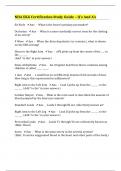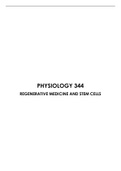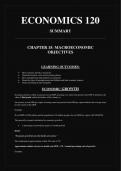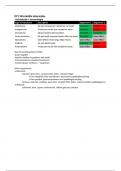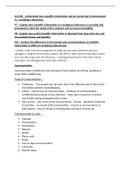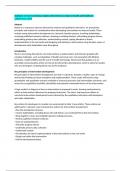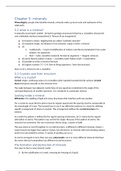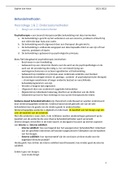HERITAGE STUDIES 2 TENTAMEN
History of collection/collecting
Start collections Classical antiquity
Museums like today Renaissance
Medieval period Church relics
1400-1600: Long distance travelling prompted collecting foreign object
age of exploration - new world -> intellectual movement
- kunst- und Wunderkammer: naturalia (nature) and artificialia
(manmade)
Types of collectors; princely collectors, doctors, elite, scholars,
royals/court
Forms of collecting; religious missionary, war, exchange and
trade, for money and goods, gift
1700-1800: - increase exploratory voyages
enlightenment period - Captain Cook (Hawaii), Humboldt (Americas)
- empire, slave-trade -> increase scientific collections
History of museums and collections (19th-20th century)
Creation of First almost all collections in the hands of private individuals, hortus
museums in botanises or universities
the 18th and 18th century = beginning movement from private collection to public
19th c. museum
The idea of citizenship and the connection to heritage ship
- British Museum and Sir Hans Sloane (founded 1753, opened 1759), (Hans Sloanes
collection becomes national), he was a collector of collections.
- The Louvre and the French Revolution (1793), eliminating the hierarchy ->
museum of the French citizens, Napeoleon’s “Salvagerism”: he stole from rich and
gave to the people (in other places information got lost because of his sacking),
-> cared about collections because; foundation of museums is at the root of
nationalism and the formation of the nation-states. Museum becomes an
instrument of power and domination.
-> same movement is seen elsewhere in the world: Charleston Museum, South
Carolina, USA (founded 1773, opened 1824), Museo Nacional de Bellas Arts, Bueno
Aires, Argentina (1895)
Museums Building a nation-state that is defined by; -> the construction of a common identity
and which you can enforce through public displace.
collections -> inclusion and exclusion, enforces the use of a certain language, it teaches people
19th and 20th (the working class) how to behave. Museum is an instrument of control.
c. - the museum as a imagined community
Colonial - Musée de L’Homme
museums - Tropenmuseum
- Royal Museum for Central Africa
various museum categories: art, science, history, archaeology, natural history
Universal exhibitions: international exhibitions of collections showing
sections per colonialized country
-> Exhibiting people, (circus also non-ordinary people)
Museums being part of a system of exploration and exploitation
History of collection/collecting
Start collections Classical antiquity
Museums like today Renaissance
Medieval period Church relics
1400-1600: Long distance travelling prompted collecting foreign object
age of exploration - new world -> intellectual movement
- kunst- und Wunderkammer: naturalia (nature) and artificialia
(manmade)
Types of collectors; princely collectors, doctors, elite, scholars,
royals/court
Forms of collecting; religious missionary, war, exchange and
trade, for money and goods, gift
1700-1800: - increase exploratory voyages
enlightenment period - Captain Cook (Hawaii), Humboldt (Americas)
- empire, slave-trade -> increase scientific collections
History of museums and collections (19th-20th century)
Creation of First almost all collections in the hands of private individuals, hortus
museums in botanises or universities
the 18th and 18th century = beginning movement from private collection to public
19th c. museum
The idea of citizenship and the connection to heritage ship
- British Museum and Sir Hans Sloane (founded 1753, opened 1759), (Hans Sloanes
collection becomes national), he was a collector of collections.
- The Louvre and the French Revolution (1793), eliminating the hierarchy ->
museum of the French citizens, Napeoleon’s “Salvagerism”: he stole from rich and
gave to the people (in other places information got lost because of his sacking),
-> cared about collections because; foundation of museums is at the root of
nationalism and the formation of the nation-states. Museum becomes an
instrument of power and domination.
-> same movement is seen elsewhere in the world: Charleston Museum, South
Carolina, USA (founded 1773, opened 1824), Museo Nacional de Bellas Arts, Bueno
Aires, Argentina (1895)
Museums Building a nation-state that is defined by; -> the construction of a common identity
and which you can enforce through public displace.
collections -> inclusion and exclusion, enforces the use of a certain language, it teaches people
19th and 20th (the working class) how to behave. Museum is an instrument of control.
c. - the museum as a imagined community
Colonial - Musée de L’Homme
museums - Tropenmuseum
- Royal Museum for Central Africa
various museum categories: art, science, history, archaeology, natural history
Universal exhibitions: international exhibitions of collections showing
sections per colonialized country
-> Exhibiting people, (circus also non-ordinary people)
Museums being part of a system of exploration and exploitation

